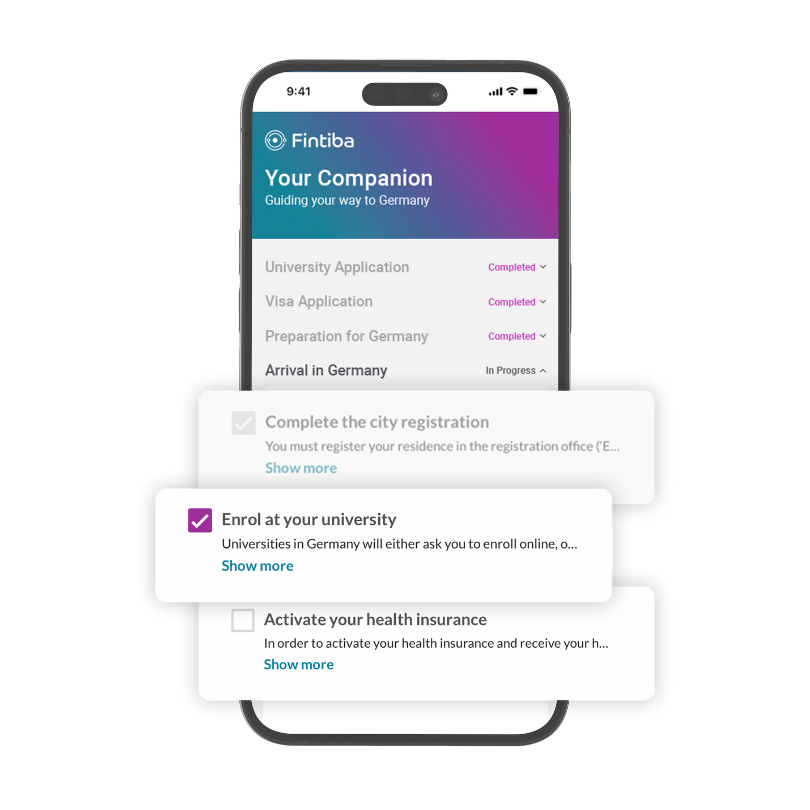If you decide to study in Germany, there are some very important questions to ask. Which university is best suited for me? How do I apply? Do I need a visa? How can I finance my studies? You can find out all this and much more in the articles on this page. Click through and learn everything you need to know for studying in Germany.
Choosing to study in Germany opens doors to a world of academic excellence and great opportunities. Germany is home to high-ranking universities, attractive study programmes, and vibrant cities. All these factors attract thousands of international students each year.
Let’s explore what makes Germany a top study destination, what the requirements are to study in Germany, the top universities and how to finance your studies.
Why study in Germany?
Study in Germany requirements
Before starting your academic journey in Germany, it is important to understand the prerequisites. The following articles have all the information you need about student visa application and the requirements as well as university qualification and language proficiency.

University qualification
Before you start applying to German universities, it is important to know what the entrance requirements and qualifications are. This will increase your chances of admission.

German Blocked Account
One of the requirements for obtaining a German student visa is a Blocked Account. What this is, how to open one and the requirements are broken down in this article.

Student health insurance
A further requirement to study in Germany is having adequate health insurance. This article clarifies the difference between travel, public and private health insurance in Germany.

Student visa & residence permit
All international students from non-EU countries need to apply for a student visa to study in Germany. Read more on how you can make the process as smooth as possible.

German language skills
Speaking German not only eases your daily life in Germany but it also improves your career prospects. Read more on why German language skills are important while studying in Germany.

Studienkolleg
Often international students need to do a preparatory course, also known as Studienkolleg. This is because various international school-leaving qualifications are not eligible for direct enrollment in German universities.
Financing your studies in Germany
While most German universities have little to no tuition fees, the living costs may still be expensive to many. Besides the Blocked Account, there are other ways you can finance your studies in Germany and ensure you do not have financial stress.

Scholarships
Scholarships offer students an excellent opportunity to pursue their academic goal without worrying about money. This article outlines all the information you need to know about scholarships in Germany.

Student loans
Taking a student loan is another viable option to cover your financial needs as a student in Germany. Find out here which potential options you have for student loan providers.

Student jobs
Both local and international students often have a student job to help them cover their living costs. However, before applying for a student job, you should be well informed on the rules and requirements.
German university and study programmes
You’re now convinced that Germany is the study destination for you but you still need to find the ideal university and study programme? Don’t worry! These articles provide you with everything you need to know- from the application timeline to what to expect from the study culture.
Getting to know German universities:

Top German universities
Every student dreams of studying at a reputable university but selecting the right one could be confusing at times. This article gives you an overview of how German universities are ranked.

University system
One of the first steps in your journey to studying in Germany is to understand the university system and the types of universities in Germany. This and more is outlined in this article.

Study programmes
What study programme to choose is one of the first challenges students face after deciding to study in Germany. Learn here how to choose the right one and which modes of study are available.
Before and during university application:

Application timeline
To ensure a smooth start in Germany, you need to be aware of the application deadlines and requirements. Here, we break down the timeline for the winter and summer semesters.

German grade calculator
During the application process, you may need to convert your grades from your home country to the German grading system. For this, you can use our German grade calculator here.

University application
Applying to universities can be stressful but it doesn’t have to be. It is important to start as early as possible. It is equally important to follow the right procedure and have the right documents.
Starting a career after graduation
You have now explored the reasons to study in Germany, understood the requirements, and gained insight into various universities and study programmes. It is equally important to know what happens after graduation.

Job search after graduation
While studying in Germany, you should already learn how to discover career opportunities. This article highlights the requirements to work in Germany and how to go about the job application process.
Last update: March 1, 2024
